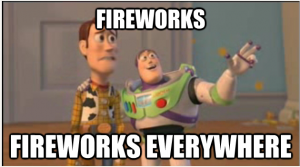It’s that time of the year again! All the chinese families are shopping for food, preparing for the big CNY dinner, and getting ready to give/get red envelopes. It is a great time period to be in China: everyone is wearing something red; many temple fairs at different locations with great traditional chinese food; and the best part: FIREWORKS!

Because you are only allowed to play with fireworks within 15 days after Chinese New Year.
Chinese New Year is a night for family. People are suppose to be together with their big family: grandparents, uncles, aunts, cousins…should all get together and have a family dinner. However, due to high ticket price and heavy work duties, many young people have decided to not go back home for this traditional holiday. Even though this is understandable, it is still a really sad decision for the parents.
Pepsi and Lay’s recognized this trend in China, and identified this as a great opportunity to for the companies. They had created different commercials addressing this problem. They used great story lines to catch consumers’ attention, and use psychological factors to influence people’s decision, at least this happened to me after i watched the commercial.
Cognitive: people think about their family, and think that Pepsi and Lay’s really care about their consumer. Also, people might think about Pepsi and Lay’s every time they think about CNY.
Affective: People will be emotional after watching the commercial and will have a good feeling/better attitude towards Pepsi and Lay’s
Behaviour: people might go purchase more Pepsi and Lay’s, especially during CNY.
Here is the commercial, it is in Chinese, but has English subtitles. Finish it if you have time, I think it is great!

